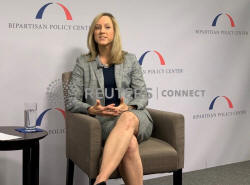U.S. Supreme Court weighs fate of consumer protection
agency
 Send a link to a friend
Send a link to a friend
 [March 03, 2020] By
Lawrence Hurley [March 03, 2020] By
Lawrence Hurley
WASHINGTON (Reuters) - The U.S. Supreme
Court on Tuesday considers a challenge backed by President Donald
Trump's administration to the structure of a federal agency assigned to
protect consumers in the financial sector that could undermine its
independence from presidential interference.
The court, which has a 5-4 conservative majority, will hear a planned
70-minute argument involving the Consumer Financial Protection Bureau (CFPB)
brought by a law firm that had been investigated by the agency, arguing
that its structure infringes on presidential powers as laid out in the
U.S. Constitution.
It is one of two significant business-related cases the court is hearing
on Tuesday. The other involves the authority of the Securities and
Exchange Commission to recover ill-gotten profits obtained through
misconduct.

Trump and his fellow Republicans have sought to undermine the CFPB,
created under his Democratic predecessor Barack Obama in 2011 in the
aftermath of the financial crisis. Trump's appointee to head the agency,
Kathy Kraninger, took office in 2018 over the objections of Democrats
and consumer advocates.
Orange County, California-based law firm Seila Law LLC has argued in the
case that the entire agency should be struck down. The most likely
outcome - and the one recommended by Trump's administration - is that
the Supreme Court rules that a president can remove the CFPB's director
at any time. The law firm lost in lower courts and appealed to the
Supreme Court.
The legal fight focuses on whether the single director of the agency,
appointed by the president to a five-year term, has too much power
because the president has limited authority to remove that individual.
[to top of second column] |

Kathy Kraninger speaks to an audience on her first set of regulatory
priorities as director of the Consumer Financial Protection Bureau
in Washington, U.S., April 17, 2019. REUTERS/Katanga Johnson/File
Photo

Seila Law argued that the structure violates the U.S. Constitution's separation
of powers provisions that vest executive authority with the president and limit
the power of Congress to encroach in that area.
Under the 2010 Dodd-Frank Wall Street reform law that established the agency,
the president can terminate a director only for "inefficiency, neglect of duty
or malfeasance in office." Lawmakers wanted the agency to be independent from
political interference.
The challenge, one of several targeting the agency, was brought by Seila, which
specializes in resolving consumer debt issues, in response to a 2017 request
from the CFPB for information and documents as part of an investigation into
whether the firm had violated federal consumer financial law.
The San Francisco-based 9th U.S. Circuit Court of Appeals ruled last year that
the CFPB's structure is constitutional.
Trump's administration and the CFPB itself agree with the challengers in the
case. The Democratic-led House of Representatives has intervened in the case in
defense of the agency.
The ruling, due by the end of June, is likely to affect a similar challenge to
the Federal Housing Finance Agency, also led by a single director.
(Reporting by Lawrence Hurley; Editing by Will Dunham)
[© 2020 Thomson Reuters. All rights
reserved.] Copyright 2020 Reuters. All rights reserved. This material may not be published,
broadcast, rewritten or redistributed.
Thompson Reuters is solely responsible for this content. |